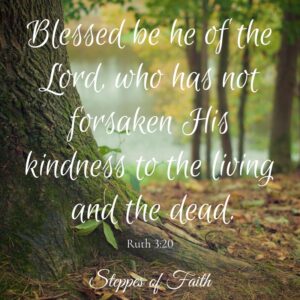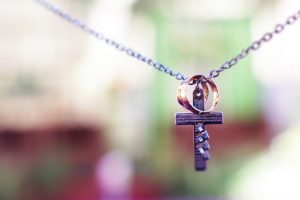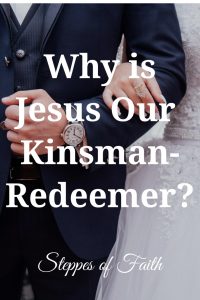
“Blessed be he of the Lord, who has not forsaken His kindness to the living and the dead!” Ruth 2:20
Things were not going well. In the book of Ruth, both Ruth and her mother-in-law, Naomi, have lost their husbands as well as Naomi’s two sons. The Bible does not clearly state how they died, but it appears it was due to a famine in the land at the time. The loss of every male in the family left Naomi and her daughters-in-law without a male protector or a source of income.
Without a male in the family, most women at that time were left to die. Typically, there was scorn and shame, and they were doomed to poverty since it was only males who could make any money or own property. Naomi and her daughters had no choice but to try to make it on their own.
With the future looking bleak, Naomi decided to leave Moab and return to her native Bethlehem, thus allowing her daughters-in-law to return to their families. One daughter left, but Ruth begged to stay with Naomi. Together, they traveled back to Judah. By divine appointment, once they arrived, Naomi soon reunited with a forgotten relative of her husband’s.
His name was Boaz.
Ruth and Boaz
Boaz was a successful and well-respected farmer in Bethlehem. It was harvesting time when Naomi and Ruth arrived. As such, Boaz’s workers were busy bringing in the crops, leaving the corners of the field untouched, according to the Law (Lev 19:9-10; 23:22). Those areas were reserved for the poor to gather food for themselves. This is where we find Ruth, harvesting the corners of Boaz’s fields.
Ruth routinely went to Boaz’s fields for about a year and became a well-known presence. Finally, Boaz asked about her and allowed her to glean along with his servant girls. He later explained to Ruth that he is impressed that she left her family and country to journey to a foreign land so she could take care of Naomi (2:11-12). But his unusual favor toward her seems to indicate he thought she was not only brave and honorable but also attractive.
One day, Naomi suggests to Ruth that she put on her finest clothes and go to Boaz in the threshing room, then wait until he finishes eating and drinking and goes to sleep. She instructs Ruth to uncover Boaz’s feet after he lies down (possibly in the hope the cold air will wake him) and then lie next to him.
Boaz is startled awake in the middle of the night, finding Ruth at his feet. She asks him to spread the corner of his garment over her to indicate he would marry her (Ez 16:8) and be her kinsman-redeemer. Finding favor in her, he agrees to it, blesses her, and allows her to continue sleeping there for the rest of the night (ch. 3).
Ordinarily, a woman behaving this way with a man on a threshing room floor in the middle of the night would be considered completely scandalous.
The Old Testament often refers to acts of uncovering as an indication of illicit sexual relations, and threshing room floors were common locations for immoral sexual activities. Ruth lying down next to Boaz also implies sexual intent based on Genesis 19:33. Additionally, the Old Testament sometimes uses “feet” as a euphemism for male sexual organs (Ex 4:25; Jdg 3:24; 1 Sam 24:3; Is 7:20).
In every way, Naomi’s plan should have shamed Ruth forever and instituted a type of death sentence. Yet, God orchestrated this moment for a divine purpose that He would not reveal for over a thousand years.

What is a Kinsman-Redeemer?
In Hebrew, the word for kinsman-redeemer is Go’el HaDahm, stemming from the word lig’ol, which means “to redeem.”
As the name implies, a kinsman is a family relation, usually the next of kin if there is no brother or another male in the immediate family. According to modern dictionaries, a redeemer is also someone who “buys, buys back, recovers, pays off, or exchanges something for goods.” Therefore, a kinsman-redeemer is someone, usually the nearest relative, charged with the duty of restoring or recovering the rights of another relative and avenging any wrongs in exchange for something.
By law, the kinsman-redeemer had two primary responsibilities: (1) to redeem family property that had changed ownership, and (2) to marry a childless widow and raise children in her dead husband’s name. The Bible indicates that either the male relative could initiate the redemption or the woman could request it, as evidenced by Ruth.
Confusion arises when we realize that Ruth was not related to Boaz in any way. However, Naomi was, so the solution is simple. Naomi initiated Ruth’s actions by instructing her to lie down next to Boaz on the threshing floor. Because it was under Naomi’s instruction, Ruth was well within the law.
But there was one small problem.
Making It Official
Later that evening, in the threshing room, Boaz revealed to Ruth that he was not Naomi’s closest relative (3:12-13). He had the first right of refusal; therefore, she must present herself to him first. But if he does not want her, Boaz promised to replace him as kinsman-redeemer.
Becoming a kinsman-redeemer was commonly done in the presence of the town elders to make it official. So the next morning, Boaz went into town and offered Ruth and all of Naomi’s husband’s land to the rightful kinsman-redeemer. The unnamed man wanted the land, but he did not want Ruth because of her Moabite heritage. He took off his sandal as an act of a legally binding transaction and handed it to Boaz, who turned and announced to the elders sitting nearby…
“Today, you are witnesses that I have bought from Naomi all the property of Elimelech, Killion, and Mahlon (Naomi’s husband and sons). I have also acquired Ruth the Moabitess, Mahlon’s widow, as my wife in order to maintain the name of the dead with his property so that his name will not disappear from among his family or from the town records. Today, you are witnesses!” (4:9-10)
Boaz, the kinsman, redeemed his relative’s wife, Naomi, and restored her dead husband’s property and good name in exchange for Ruth’s hand in marriage. Now, neither woman will be alone, and they will never again have to pick the fields to survive.
What makes this story even better is that Boaz and Ruth’s relationship was not solely transactional; they sincerely loved each other. Out of that love and in accordance with God’s plans, they later gave birth to a son named Obed, who eventually became the grandfather of King David and established the lineage that paved the way for Jesus’ prophetic birth as the Messiah.
Jesus Our Kinsman-Redeemer
Like Boaz, Jesus is also a kinsman-redeemer. Because all brothers and sisters in Christ are co-heirs to the throne (Rom 8:17), Jesus becomes our holy brother (Heb 2:11). He is our nearest relative.
“Therefore, He had to be made like His brothers in every respect, so that He might become a merciful and faithful high priest in the service of God, to make propitiation for the sins of the people.” (Heb 2:17)
Though historically factual, the story of Ruth and Naomi is an illustration of the situation we all experience. Sin has separated us from the Father, leaving us orphans, much like Naomi and Ruth were left alone in Moab. But because of God’s holy redemption plan, Jesus became our kinsman-redeemer. Through His shed blood on the cross, He has bought our freedom from sin, restored our relationship with the Father, and redeemed us from the penalty of sin.
What About Jesus?
In exchange for being a kinsman-redeemer, Boaz gained a wife in Ruth. What does Jesus get?
Similarly, Jesus receives our hand in marriage as the church. Like a bride prepared for her groom, we, the church, join Jesus in an eternal relationship. Now, those who believe in Him as the Son of God will never be alone. Jesus’ declared faithfulness proves it. The book of Revelation reveals what the official wedding day will look like.
“I saw the Holy City, the new Jerusalem, coming down out of heaven from God, prepared as a bride beautifully dressed for her husband…Now the dwelling of God is with men, and He will live with them. They will be His people, and God Himself will be with them and be their God. He will wipe every tear from their eyes. There will be no more death or mourning or crying or pain for the old order of things has passed away.” (Rev 21:2-4)
Through Jesus’ grace and sacrifice on our behalf, we have redemption from sin, and we will enjoy eternal life with Him as His bride.

We are Just Like Ruth
Ruth’s story is remarkably like ours. In her, we see someone unable to help herself and in need of rescue. We see her requesting that someone specific become her kinsman-redeemer so he would restore and protect her in exchange for her hand in marriage.
All of us are in need of rescue from sin. We cannot do it ourselves. We need a kinsman-redeemer named Jesus. He is the only one who loved us enough to willingly pay the price for our sin (death) and make us His bride so that we can eternally enjoy His grace and blessings.
Jesus’ offer to be a kinsman-redeemer is open to everyone, not just a few chosen people. His grace is for all who seek rescue from sin and long for the freedom of salvation. Jesus has declared that He will save anyone who calls out to Him (Joel 2:32; Rom 10:13). No strings attached, and no questions asked—just simple salvation with a promise of complete restoration and eternal life.
Jesus is our true kinsman-redeemer. Praise the Lord for His goodness and love.
Further Reading
In 2001, Pastor John MacArthur wrote a great sermon about Jesus being our kinsman-redeemer. Grace to You reprinted the sermon in its entirety. It’s very informative and full of great Bible history. You can either read or listen to the whole thing right here. Enjoy!

I am confused. The bible says that Jesus is our Father, for all things were made by him, but it never says that he is our brother. Please help me to understand.
Jesus is not the Father but the Son, the Son of God, the second in the trinity of God. And He is our kinsman redeemer, the One who paid the price of death to redeem us from sin.
Hebrews 2:11. For both He who sanctifes and those who are being sanctified are all one, for which reason He is not ashamed to call them
“brethren” This is Jesus speaking> He declares us as His family, as His brothren. John 14 says (Jesus) If you have seen Me you have seen the Father. John 10:30 My Father and I are ONE.
Thank you helped me for a BS on the book of ruth…
Happy to serve you.
Thank you for this writing it helped me on a 2 page essay for school
Glad I could help. Good luck with your paper!
We’re in a precept about Ruth now and I was looking for articles about the ‘relational’ connection of Kinsman-Redeemer. I appreciate your article and the way you’ve captured this for me to understand. What a great image of Christ in the Book of Ruth and your writing above.
I went looking fir who or what a kinsman redeemer is and found this. Thank God for you and mist appreciate your ability to simplify it and draw us into the knowledge of who Chrust is to us.
Grace, peace a mercy to you and all that concerns you. God keep you always.
Thank you, Jackie. The Lord bless you and keep you.
Grace and mercy be unto you as God continue to use you to help others. We are not perfect people, but servants of a perfect God. Keep up the great work for our soon and coming king.
Thank you, Betsy. The Lord bless you and keep you.
Beautiful!!! This was enlightening.
The write up is such a blessing that I still have a longing in my soul for more
This is super! Writing a book on the concept of redemption and truthfully this has helped.
I enjoyed this very much,as it confirmed what the Lord revealed to me about Christ being our Kinsman Redeemer! Thank you for letting God you use you! God continue to bless and keep you!
Thank you, Nichole. God bless you always!
Thank you Gina for your beautiful writing on our Kinsman Redeemer.
I am awed by your peaceful responses to those who call themselves Christians ( Christ Like) yet are very critical and miss the Holy Spirit revelation by correcting your understanding. God bless you and yours. Have a very blessed Christmas…I read this article because the word Kinsman Redeemer came to my heart so I was looking to make sure I was hearing the Lord and found this article. Blessings ! Kim
Thank you, Kimberly. Such sweet words! I am so glad I could bless you. I pray you and your family have a very Merry Christmas and joyous New Year. Please stop by anytime!
The Text in Ruth 2 is very clear at the beginning Boaz was a relative of Elimelech NOT Naomi as you stated. His Obligation as a relative of Elimelech was to take care of Naomi and Ruth.
Also it was not a year but immediately. The transitional text 1;22 says they arrived at Bethlehem at the beginning of harvest and 2;2 has Ruth immediately going out to work.
No wait time. Immediate.
Also, There is a huge age gap between the age of Boaz and Ruth. The description of Boaz makes him out to be a Godly Man, a man of valor, and standing in the community. He’s not some young chap eyeing young girls. So adding he found her “beautiful” is beside the point and adds a sexual intent. The whole of the Chapter 2 is point out His HESED kindness of the Lord, “under whose wings” Ruth has sought refuge.
While your intent is to make the point of Jesus being our kinsman redeemer, and you include a basic gospel message, there is a gap in your connection with us.
I came to see what you had to say about Jesus being our Kinsman Redeemer and found it wanting. Its a big responsibility to provide teaching. It needs to be accurate and faithful.
Lest their blood be upon your head….
I apologize you didn’t enjoy the article, but here are the facts. Naomi was Elimelech’s mother. So by relation, Boaz was a distant relative. And I did not say their journey to Bethlehem happened a year later. You didn’t read that right. I also indicated Ruth went to the fields to harvest what she could immediately. Again, you missed that. I suggest you also be careful, sir, lest you miss the spirit of the Lord going past.
Naomi was Elimelech’s widow. Naomi was mother to two sons by Elimelech, Mahlon (married to Ruth) and Chilion (married to Orpah.
This is a really helpful write up. I think you should ask the Lord to lead you to also help people in their faith walk and not to look for where to punch holes in a person’s work who’s genuinely trying to help others increase in their revelation of the person and work of Jesus. Your points do not make much sense, you could have just added if you wanted to, and not say stuff like “their blood will be on your head”, that’s rather severe considering it was a matter of relationship and time frame. The heart of the message is simple: Boaz was a type of Christ, simple!
Types and shadows that’s all!
I’m not sure where you thought I was punching any holes in someone’s story or warning that blood would be on someone’s head. This is all straight from God’s word. If you think it doesn’t make sense, I suggest you go back and read the book of Ruth once again. And no, Boaz was not a type of Christ. There is only one Christ, and His name is Jesus. Boaz was simply obeying Jewish law and, thus, continuing the scarlet thread. I pray the Lord reveals truth to you and increases you in wisdom.
Hi Mariah. I appreciate the feedback. It’s important we always lift each other up in truth and love. Yes, I struggled with how to word that section so there was no confusion. In the end, I chose to streamline it in the interest of not overwhelming the reader in case they weren’t as much of a Bible geek as me. Knowing that both laws applied in Ruth’s case does make the story even more interesting, I agree. Thank you for your thoughts. Feel free to reach out again. I’m always willing to learn and grow in Christ. God bless.
Hello! I was happy to see that you took on such a theologically important passage! I love the connection of Jesus being the ultimate kinsman redeemer.
However, I do have a correction for you. Under the section “What is a Kinsman Redeemer?”, you state that the role of a kinsman redeemer is two-fold. But if you look at Leviticus 25:25, the passage about kinsman redeemers, it only affirms the first role that you have listed.
The second responsibility that you have described there is actually completely unrelated to the duties of a kinsman redeemer. You are referring to the levitate law found in Deuteronomy 25:5 where a the brother of a deceased man is to carry out the responsibility you described.
So actually, Ruth gets even more interesting when you understand that she was applying not just one, but two laws in Ruth 3:9.
Perhaps you didn’t mention the distinction because it would distract from the main point you were trying to make. I can understand this, but the law in the Bible very clearly does not say what you said. In this case, it would have been better to word your sentence differently to avoid this problem.
I want your teachings to be as truthful and clear as possible. Thank you for sharing what the Lord has revealed to you!